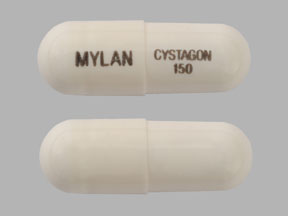Cysteamine Disease Interactions
There are 3 disease interactions with cysteamine.
Cysteamine (applies to cysteamine) alcoholism
Major Potential Hazard, Moderate plausibility.
The use of alcohol may increase the rate of cysteamine release and/or adversely alter the pharmacokinetic properties, as well as the effectiveness and safety. It is recommended to avoid the consumption of alcoholic beverages during treatment with cysteamine.
References
- (2013) "Product Information. Procysbi (cysteamine)." Raptor Pharmaceutical Corporation
Cysteamine (applies to cysteamine) GI disorders
Moderate Potential Hazard, Moderate plausibility. Applicable conditions: Gastrointestinal Hemorrhage, Inflammatory Bowel Disease
Gastrointestinal tract symptoms including nausea, vomiting, anorexia, abdominal pain, gastrointestinal ulceration and bleeding have been associated with cysteamine, sometimes severe. Caution is advised in patients with gastrointestinal disorders or history if gastrointestinal ulcers or bleeding. Physicians should follow patients for signs and symptoms of gastrointestinal ulceration and bleeding, and should inform patients and/or guardians of the importance of this follow-up.
References
- (2013) "Product Information. Procysbi (cysteamine)." Raptor Pharmaceutical Corporation
Cysteamine (applies to cysteamine) liver disease
Moderate Potential Hazard, Moderate plausibility.
The use of cysteamine has been associated with development of hepatic coma in patients with overt hepatic damage. Therapy with cysteamine should be administered cautiously in patients with liver disease.
References
- (2001) "Product Information. Cystagon (cysteamine)." Mylan Pharmaceuticals Inc
More about cysteamine
- cysteamine consumer information
- Compare alternatives
- Side effects
- Dosage information
- During pregnancy
- Drug class: miscellaneous uncategorized agents
- En español
Related treatment guides
Drug Interaction Classification
| Highly clinically significant. Avoid combinations; the risk of the interaction outweighs the benefit. | |
| Moderately clinically significant. Usually avoid combinations; use it only under special circumstances. | |
| Minimally clinically significant. Minimize risk; assess risk and consider an alternative drug, take steps to circumvent the interaction risk and/or institute a monitoring plan. | |
| No interaction information available. |
Further information
Always consult your healthcare provider to ensure the information displayed on this page applies to your personal circumstances.


